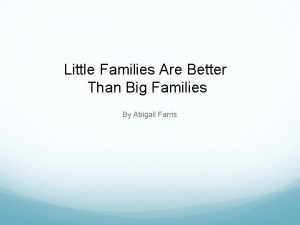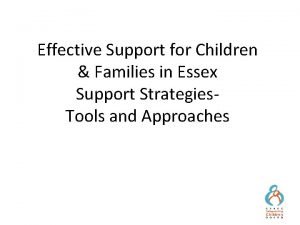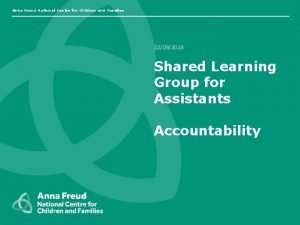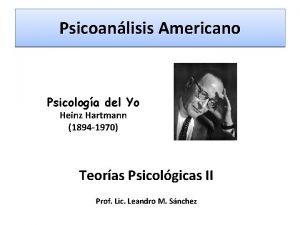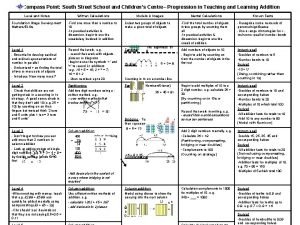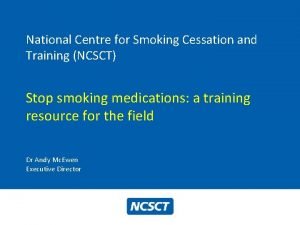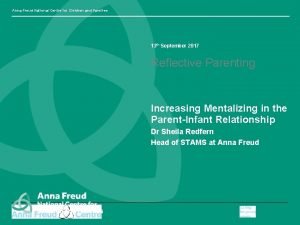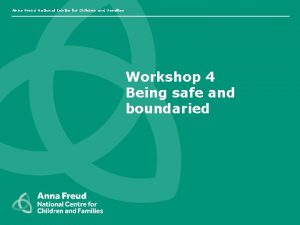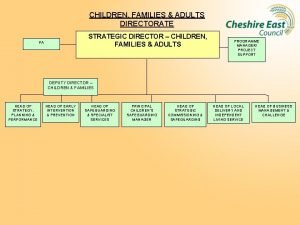Anna Freud National Centre for Children and Families




















- Slides: 20

Anna Freud National Centre for Children and Families Workshop 2 Getting started with your peer support programme

Anna Freud National Centre for Children and Families Workshop 2 - Getting started with your peer support programme Workshop 2 Learning Objectives • Understanding of recommended steps to setting up your peer support programme. • Have considered how you will recruit your peer mentors. • Have considered different models for delivery of peer support in your setting and have early ideas on what you will choose. • Have considered different approaches to identifying mentees. • Have a good understanding of the centrality of involving peer mentors in the design of the programme and have experienced doing this. 2

Anna Freud National Centre for Children and Families Workshop 2 - Getting started with your peer support programme Introduction to workshop • This workshop will allow you to begin to plan what your new or refined peer support programme will look like in your setting. • You will be supported in this planning by your colleagues in the room, by the trainers and by young people who have experience of being involved in peer support programmes. • If you already facilitate a peer support programme you should consider, how you could refine it based on learning from this training. • This workshop is supported by Chapter 2 in your toolkit. 3

Anna Freud National Centre for Children and Families Workshop 2 -Getting started with your peer support programme Suggested steps involved in setting up your peer support programme Considered in this workshop • Recruit a small group of CYP as peer mentors to help you establish the programme. • Plan the nature of the programme with your peer mentors. Considered in Workshop 3 tomorrow • Train the peer mentors using the three 1 hour session plans in your toolkit. 4

Anna Freud National Centre for Children and Families Workshop 2 -Getting started with your peer support programme How will you recruit your peer mentors? • Important to recruit your peer mentors early on so that they can support you with planning of the programme. • Following slide provides key attributes to look for when recruiting peer mentors. Group to consider • How could recruit peer mentors with some or all of these attributes in your settings? • Will you allow any CYP to apply or will you select CYP? • Could you use application forms or interviews? • What does the young person in your group think would work? 5

Anna Freud National Centre for Children and Families Workshop 2 -Getting started with your peer support programme Key attributes of an ideal peer mentor • Demonstrate enthusiasm. • Be comfortable building relationships. • Be a good listener. • Be reflective and open to learning. • Hold a genuine desire to ‘give back’. • Be dependable. • Demonstrate flexibility. • Have experienced peer support themselves. • May have experienced mental health difficulties previously themselves. 6

Anna Freud National Centre for Children and Families Workshop 2 -Getting started with your peer support programme Consideration of types of peer support models • Remember peer mentors can promote positive change in the CYP they support through building relationships. • You can facilitate this to take place in different ways. Some different models to consider are: 1. Ongoing 1 -1 mentoring. 2. One-off or drop-in 1 -1 mentoring. 3. Peer mentor facilitated group wellbeing sessions. • Consider each model and whether it might work in your setting. 7

Anna Freud National Centre for Children and Families Workshop 2 -Getting started with your peer support programme 1. Ongoing 1 -1 mentoring • Peer mentors meet on an ongoing basis with their mentee. • Could be during school or after school, in a community setting or independently. • CYP from one setting (e. g. a secondary school) may mentor young CYP in a different setting (e. g. primary school). 8

Anna Freud National Centre for Children and Families Workshop 2 -Getting started with your peer support programme To consider as a group • Do you provide a structured time and location for this or do the pair meet independently? How do you ensure safety? • Could you structure the mentoring around existing creative or sports activities which could provide a more informal environment for the mentoring relationship to develop? • Could you provide food and drinks to help create an informal environment? • How do you support the pair to continue to meet over the three months of the programme? • How will you support the mentor to end the relationship appropriately? • How do you match your mentors and mentees? Of note the evidence suggests that matching on the basis of some common interest or life experience can be helpful but not essential. 9

Anna Freud National Centre for Children and Families Workshop 2 -Getting started with your peer support programme 2. One off or Drop-in Peer mentoring • Typically involve the peer mentors being available for CYP to come and talk to on a one-off or drop-in basis. Examples include the following: • Peer mentors take on roles such as playground champions, community or corridor champions. • Opportunities for CYP to approach them for a one-off or follow up conversation. • Peer mentors run drop-in clubs in schools or the community where any CYP can come along if they wish to have a conversation. • Peer mentors act as mediators facilitating peer disputes. 10

Anna Freud National Centre for Children and Families Workshop 2 -Getting started with your peer support programme To consider as a group • How is the role of the peer mentor promoted so that CYP choose to approach them for support? • How do you ensure that there is space and time for the peer mentors to have meaningful conversations with the CYP? • Could you add these drop-in sessions on to existing creative or sports activities which you are facilitating? • How do you limit the role of the peer mentors? (So that they do not take on wider responsibilities such as managing playground discipline. ) • How do you support the safety of the peer mentors in your setting? 11

Anna Freud National Centre for Children and Families Workshop 2 -Getting started with your peer support programme 3. Peer mentor facilitation of wellbeing sessions • May involve a peer mentor helping to develop and facilitate training sessions on topics such as bullying or confidence. • The peer mentors bring their ability to connect with the CYP they are working with and their ability to build relationships with them. • These sessions may be facilitated for all CYP or for particular targeted groups of CYP. • May become an ongoing regular group facilitated by one or a group of peer mentors. Examples of this could include, a peer support wellbeing lunch time or an after school group. 12

Anna Freud National Centre for Children and Families Workshop 2 -Getting started with your peer support programme To consider as a group • How do you ensure the peer mentors have the subject matter knowledge to facilitate these sessions in addition to their core skills as a peer mentor? • Could you involve the peer mentors in developing session plans? • How do you ensure the peer mentors still have time in these sessions to build relationships with the CYP they are supporting? • As with any peer mentoring how do you ensure that the peer mentors still receive support and supervision regarding any safeguarding or other concerns which come up in these sessions? (Will be covered tomorrow). 13

Anna Freud National Centre for Children and Families Workshop 2 -Getting started with your peer support programme Who will you target for peer support? • All CYP can benefit from peer support. • However evidence that CYP with early mental health difficulties or at risk of of mental health difficulties likely to benefit the most. • In this context, who does your programme target for peer support? Group to consider 3 approaches: 1. Open access/available to all. (universal) 2. Staff referral. (targeted) 3. CYP self referral. (targeted) 14

Anna Freud National Centre for Children and Families Workshop 2 -Getting started with your peer support programme 1. Open access programme (Universal) • Any CYP can access peer support. To consider as a group the benefits and risks Benefits • CYP don’t feel singled out for peer support which helps to reduce stigma. This may mean they are more keen to take part. • CYP who could benefit from support are likely to access support. Risks • Your peer mentors are not targeted at supporting those CYP who could potentially benefit the most. 15

Anna Freud National Centre for Children and Families Workshop 2 -Getting started with your peer support programme 2. Mentees referred by staff (Targeted) • Mentees are selected by staff. Other professionals working with these CYP might also refer. To consider as a group the benefits and risks Benefits • Professionals working with CYP can be very effective at identifying those who could benefit from the support of a peer mentor. • A referral form can aid the selection process. Risks • It could be stigmatising for CYP taking part. • Staff may also identify CYP with too high levels of need who need specialist support and miss CYP with emerging difficulties who could benefit from peer support. 16

Anna Freud National Centre for Children and Families Workshop 2 -Getting started with your peer support programme 3. Mentees self-refer for programme (Targeted) To consider as a group the benefits and risks Benefits • CYP who could benefit from support are likely to come forward. • Use of a self-referral form can help to target the right CYP. • CYP are likely to find this less stigmatising then being referred by staff. Risks • CYP who could benefit from support may be reluctant to self- refer. 17

Anna Freud National Centre for Children and Families Workshop 2 -Getting started with your peer support programme Criteria to consider for selecting mentees for a targeted programme Spend 5 mins reviewing following templates found in the supporting document accompanying your toolkit: • Possible referral criteria to use to encourage CYP to self-refer to have a mentor. • Possible referral criteria to use to support your colleagues to refer CYP to have a mentor. 18

Anna Freud National Centre for Children and Families Workshop 2 -Getting started with your peer support programme How will you promote your peer support programme? Group to consider. • How will your programme be promoted to ensure it engages with the mentees you are seeking to reach? • How do you ensure that the programme has a positive reputation in your setting and that CYP taking part are not stigmatised? • How do CYP involved think it should be promoted? • How could they be involved in the promotion? 19

Anna Freud National Centre for Children and Families Workshop 2 -Getting started with your peer support programme Summary-Review of Learning Objectives • Understanding of recommended steps to setting up your peer support programme. • Have considered how you will recruit your peer mentors. • Have considered different models for delivery of peer support in your setting and have early ideas on what you will choose. • Have considered different approaches to identifying mentees. • Have a good understanding of the centrality of involving peer mentors in the design of the programme and have experienced doing this. 20
 Little families
Little families Effective support for children and families in essex
Effective support for children and families in essex Georgia department of children and families
Georgia department of children and families Pod anna freud
Pod anna freud Teori anna freud
Teori anna freud Heinz hartmann
Heinz hartmann Anna freud defense mechanisms
Anna freud defense mechanisms Downderry children's and family centre
Downderry children's and family centre Problems on centroid in engineering mechanics
Problems on centroid in engineering mechanics Centre of gravity of various shapes
Centre of gravity of various shapes Clarivites
Clarivites Compass point children's centre
Compass point children's centre Old moat children's centre
Old moat children's centre Ncsct training
Ncsct training National centre for statistics and information oman
National centre for statistics and information oman National health policy for children
National health policy for children National children's science congress projects ideas
National children's science congress projects ideas National service framework children
National service framework children National programmes related to child health and welfare ppt
National programmes related to child health and welfare ppt National children's digital health collaborative
National children's digital health collaborative Police national assessment centre
Police national assessment centre
